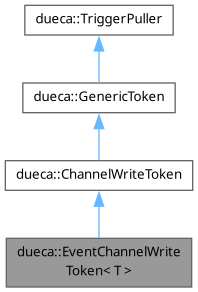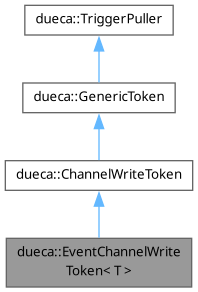An EventChannelWriteToken can be used to write data to an event channel. More...
#include <EventAccessToken.hxx>


Public Member Functions | |
| EventChannelWriteToken (const GlobalId &holder, const NameSet &name_set, const ChannelDistribution &d=ChannelDistribution::SOLO_SEND, const Channel::TransportClass tclass=Channel::Regular, GenericCallback *when_valid=NULL) | |
| Constructor. | |
| ~EventChannelWriteToken () | |
| Destructor. | |
| void | sendEvent (const T *edata, const DataTimeSpec &ts) |
| Send an event over the channel. | |
| void | sendEvent (const T *edata, const TimeTickType &t) __attribute__((deprecated)) |
| Send an event over the channel. | |
 Public Member Functions inherited from dueca::ChannelWriteToken Public Member Functions inherited from dueca::ChannelWriteToken | |
| ChannelWriteToken (const GlobalId &owner, const NameSet &channelname, const std::string &dataclassname, const std::string &entrylabel=std::string(), Channel::EntryTimeAspect time_aspect=Channel::Continuous, Channel::EntryArity arity=Channel::OnlyOneEntry, Channel::PackingMode packmode=Channel::OnlyFullPacking, Channel::TransportClass tclass=Channel::Regular, const UCallbackOrActivity &when_valid=UCallbackOrActivity(), unsigned nreservations=0) | |
| Constructor, creates a token to write data in the channel, and if needed it creates the associated channel end. | |
| ~ChannelWriteToken () | |
| Destructor. | |
| void | decodeAndWriteData (AmorphReStore &s, const DataTimeSpec &ts) |
| Write channel data from a storage object. | |
| bool | isValid () |
| Check the validity of the token. | |
| entryid_type | getEntryId () const |
| Get the entry number. | |
| ChannelEntryInfo | getChannelEntryInfo () const |
| Retrieve creation/entry information. | |
| bool | applyFunctor (DCOFunctor *fnct, const DataTimeSpec &time) |
| Apply a given functor to write channel data. | |
| void | reWrite (const DataTimeSpec &time) |
| Simply re-write the current (or default) data for a new time. | |
| const std::string & | getDataClassName () const |
| Return the data class. | |
 Public Member Functions inherited from dueca::GenericToken Public Member Functions inherited from dueca::GenericToken | |
| const GlobalId & | getTokenHolder () const |
| Return the ID of the owner. | |
| const GlobalId & | getChannelId () const |
| Return the ID of the channel. | |
| const NameSet & | getName () const |
| Return the local name specified for the token. | |
| const std::string & | getDataClassName () const |
| Return the data class name. | |
| uint32_t | getDataClassMagic () const |
| Access the data class magic. | |
| virtual | ~GenericToken () |
| Destructor. | |
| GenericToken (const GlobalId &holder, const NameSet &name, const std::string &dataclassname) | |
| Constructor. | |
| template<class MFT > | |
| std::weak_ptr< MFT > | getMetaFunctor (const std::string &fname) const |
| Obtain a specific metafunctor for interaction with channel data. | |
 Public Member Functions inherited from dueca::TriggerPuller Public Member Functions inherited from dueca::TriggerPuller | |
| const std::string & | getTriggerName () const |
| Find a name. | |
Friends | |
| class | EventWriter< T > |
| void | wrapSendEvent (EventChannelWriteToken< T > &t, const T *edata, const TimeTickType &tick) |
| The "wrapSendEvent" function can be used to send an event with self-allocated event data. | |
Additional Inherited Members | |
 Protected Types inherited from dueca::TriggerPuller Protected Types inherited from dueca::TriggerPuller | |
| typedef list< TargetData > | targetlist_type |
| Combination of a target, someone to pull if requested, and the index that target needs to identify this puller. | |
 Protected Member Functions inherited from dueca::ChannelWriteToken Protected Member Functions inherited from dueca::ChannelWriteToken | |
| void * | getAccess (uint32_t magic) |
| Return a void pointer to a new data location. | |
| void | checkAccess (uint32_t magic) |
| Check whether magic is good, and token is valid. | |
| void | releaseAccess (const void *data_ptr, const DataTimeSpec &ts) |
| Return the read access given previously, creating the effective write,. | |
| void | discardAccess (const void *data_ptr) |
| Discard the read access, abandoning an attempted write. | |
 Protected Member Functions inherited from dueca::GenericToken Protected Member Functions inherited from dueca::GenericToken | |
| void | checkChannelEndPresent () const |
| Check preconditions. | |
 Protected Member Functions inherited from dueca::TriggerPuller Protected Member Functions inherited from dueca::TriggerPuller | |
| void | pull (const DataTimeSpec &ts) |
| activate and notify the targets | |
| TriggerPuller (const std::string &name=std::string()) | |
| Constructor. | |
| virtual | ~TriggerPuller () |
| Destructor. | |
| virtual void | addTarget (const boost::intrusive_ptr< TriggerTarget > &target, unsigned id) |
| Add a target to this puller, only called by TriggerTarget's setTrigger. | |
| virtual void | removeTarget (const TriggerTarget *target) |
| Remove a target from the puller, only called by destructor. | |
| virtual void | setTriggerName () |
| Update the name, used by ConditionAnd and ConditionOr. | |
 Protected Attributes inherited from dueca::GenericToken Protected Attributes inherited from dueca::GenericToken | |
| std::string | dataclassname |
| name of the data type | |
| const DataSetConverter * | converter |
| Converter for the data. | |
| uint32_t | magic_number |
| magic number for the data class name claimed here | |
| UnifiedChannel * | channel |
| pointer to the channel | |
 Protected Attributes inherited from dueca::TriggerPuller Protected Attributes inherited from dueca::TriggerPuller | |
| targetlist_type | targets |
| List of targets and indices. | |
| std::bitset< MAX_MANAGERS > | activitylevels |
| Index of activitymanager levels. | |
| std::string | name |
| Name, for debugging purposes. | |
Detailed Description
class dueca::EventChannelWriteToken< T >
An EventChannelWriteToken can be used to write data to an event channel.
Note that EventChannelWriteToken is supplied for compatibility with older DUECA (<2). For new code you are advised to create ChannelWriteToken objects.
Construct the access token and keep it, to gain access to the channel. Please check with GenericToken::isValid() before writing.
Note that EventChannelWriteToken is obsolete; please use ChannelWriteToken in new code.
Constructor & Destructor Documentation
◆ EventChannelWriteToken()
| dueca::EventChannelWriteToken< T >::EventChannelWriteToken | ( | const GlobalId & | holder, |
| const NameSet & | name_set, | ||
| const ChannelDistribution & | d = ChannelDistribution::SOLO_SEND, | ||
| const Channel::TransportClass | tclass = Channel::Regular, | ||
| GenericCallback * | when_valid = NULL ) |
Constructor.
Constructs an access token to write the event channel with the specified name.
- Parameters
-
holder ID of the requester. name_set NameSet with the name of the channel that you request access for. d Type of "distribution". SOLO_SEND means that you will be the only sender, NO_OPINION means that you don't want to change the distribution type. tclass Transport class for the channel. Current options are Regular and Bulk. when_valid A callback object, that is called once, as soon as any consumers of the channel data are reported. The channel can be used before this call, but the data goes off to nowhere, so it has no sense. If you only really want to start when there is someone who needs your data, use this callback. If you don't care, forget about it.
◆ ~EventChannelWriteToken()
| dueca::EventChannelWriteToken< T >::~EventChannelWriteToken | ( | ) |
Destructor.
Returns access to the channel.
Member Function Documentation
◆ sendEvent() [1/2]
|
inline |
Send an event over the channel.
The data you offered is taken over by the event, please don't destroy.
- Parameters
-
edata Pointer to the data object to be sent. Will be freed by the channel. ts Time specification for sending the event.
◆ sendEvent() [2/2]
|
inline |
Send an event over the channel.
The data you offered is taken over by the event, please don't destroy.
- Parameters
-
edata Pointer to the data object to be sent. Will be freed by the channel. t Simulation time for sending the event.
Friends And Related Symbol Documentation
◆ wrapSendEvent
|
friend |
The "wrapSendEvent" function can be used to send an event with self-allocated event data.
Note that the use of this function should be reserved to people who really know what they are doing, and only if there is a real (performance) need, if you are not one of these, inform yourself well or use a DataWriter, which provides a much safer interface to the channel.
The documentation for this class was generated from the following file:
- /home/abuild/rpmbuild/BUILD/dueca-4.2.5-build/dueca-4.2.5/dueca/EventAccessToken.hxx